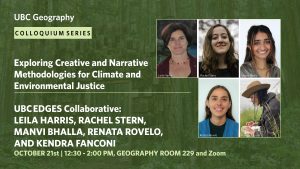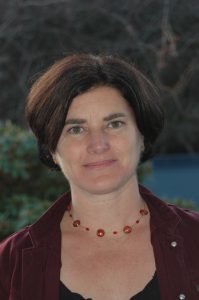

Speakers from UBC EDGES Collaborative:
Leila Harris Institute for Resources, Environment and Sustainability (IRES) and Institute for Gender, Race, Sexuality and Social Justice (GRSJ), UBC
Rachel Stern Department of Geography, UBC
Manvi Bhalla Institute for Resources, Environment and Sustainability (IRES), UBC
Renata Rovelo Institute for Resources, Environment and Sustainability (IRES), UBC
Kendra Fanconi, Artist, Director, Creator
Talk title:
Exploring Creative and Narrative Methodologies for Climate and Environmental Justice


From a workshop of Museum of Rain, written and directed by Kendra Fanconi, dramaturgy by Dr Leila Harris, Audience and actor Lisa Goebel, 2019.
Talk Abstract:
In recent scholarship on environmental-social relations, story has been a focal point for understanding how climate and environmental inequities are experienced in embodied and emotional ways (Harris, 2021). Storytelling methods such as oral histories, narrative and fictional expressions, visual methods using photographs, and creative mapping also can become ways for communities and organizations to leverage counter-narratives for social transformation and justice (Houston, 2013; Gonzalez-Hidalgo et al., 2022; de Vet, 2013). This panel focuses on storytelling’s role in understanding and responding to climate and environmental injustices.
The panel asks: How can a focus on method and different types of storytelling about social relationships with the environment? What types of oral, visual, written, and performance-based methods are scholars and communities using to tell stories about their relationships to environmental and social justice? How are understandings of climate risk formed and negotiated through storytelling practices?
The participants on this panel will draw from different experiences with oral methodologies, community organizing, performance and theatre, and place-based narratives. They bring expertise from diverse environmental and social contexts on topics such as Indigenous climate action; water justice; intersectional environmental justice in the face of toxic exposure; immersive artistic practice, theatre, and housing and extreme heat. The goal of this panel is two-fold: first, to reflect on the potential and difficulties of using storytelling as a method, and second, to inspire practical methodology sharing across different environmental and geographical contexts.


From tinkers, adapted from the novel by Paul Harding, directed by Kendra Fanconi, set design by Cornelia Konrad, 2016.
Speaker Bios:


Leila Harris is a Professor at IRES Institute on Resources Environment and Sustainability and Institute for Gender, Race, Sexuality and Social Justice. Faculty Associate at UBC Department of Geography, Faculty Associate at Peter Wall Institute for Advanced Studies, Co-Director of the Program on Water Governance, The University of British Columbia.


Rachel Stern is a geographer and researcher focused on the intersection of land rights, transitional justice, and political ecology. She is pursuing a Master of Arts in the Department of Geography at UBC, co-supervised by Mohammed Rafi Arefin (Geography) and Leila Harris (IRES).


Manvi Bhalla (she/her) is an activist-scholar with over 15 years of community organizing experience. She is recognized as one of Canada’s ‘Top 25 Under 25’ environmentalists, ‘Top 30 Under 30’ sustainability leaders and was honoured with the ‘Youth Eco-Hero of the Year’ award in 2022. She co-founded Shake Up The Establishment, a national nonprofit dedicated to climate justice & political advocacy, alongside missINFORMED, a nonprofit focused on health promotion for women and gender-diverse people. Alongside her advocacy work, Manvi is a published health researcher, frequent public speaker and guest lecturer who works to centre anti-colonial approaches. During her MSc, she investigated barriers towards climate action within the public health sector. Presently, she is a PhD student at University of British Columbia with SSHRC Doctoral Fellowship funding.


Renata Rovelo is a MA student at the Institute for Resources, Environment and Sustainability, under the supervision of Professor Leila Harris. As a member of the EDGES Research Collaborative, her research explores the non-material dimensions of water for Indigenous peoples, with a particular focus on the Squamish People.


Kendra Fanconi is a director, writer and creator of original site‑specific theatre works. She co‑founded The Only Animal, a company uniquely dedicated to theatre that springs from a deep engagement with place and led the company as Artistic Director for 17 years. Kendra is known for her love of the impossible.
This is hybrid event hosted in Geog 229 and on zoom.

